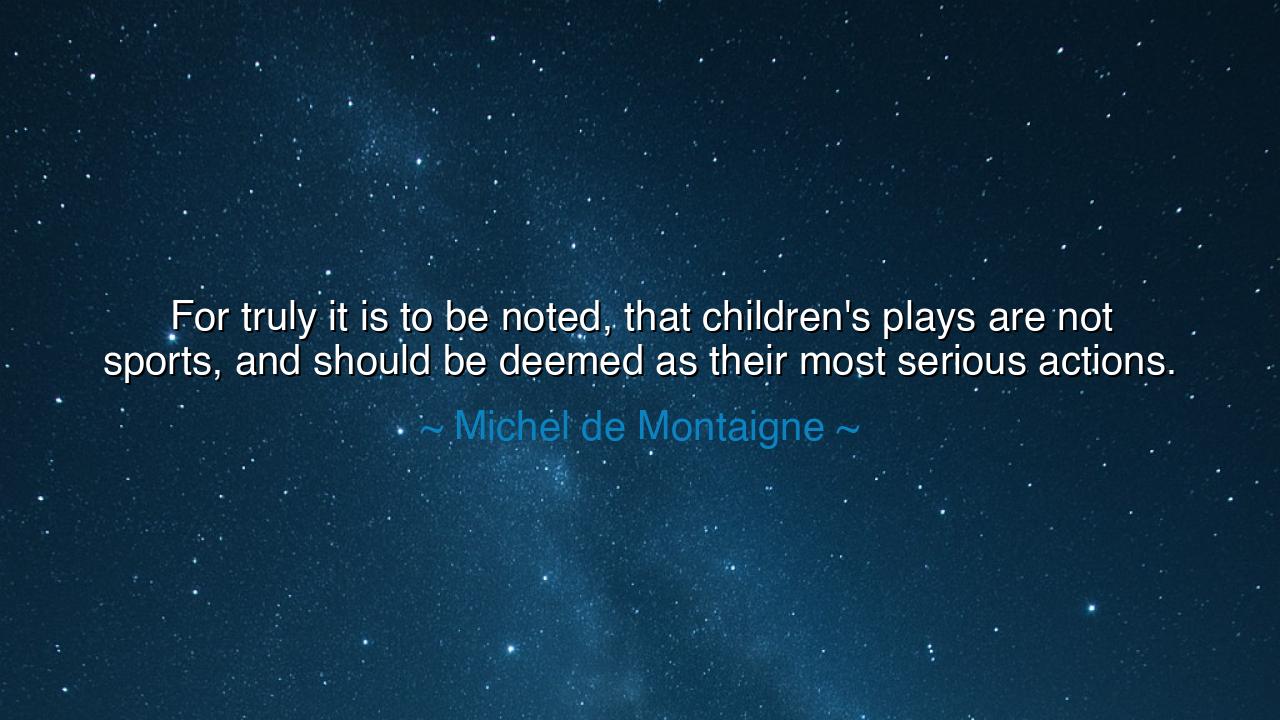
For truly it is to be noted, that children's plays are not
For truly it is to be noted, that children's plays are not sports, and should be deemed as their most serious actions.






Hear the words of Michel de Montaigne, wise essayist of the Renaissance, who observed with piercing clarity: “For truly it is to be noted, that children’s plays are not sports, and should be deemed as their most serious actions.” At first, his words may seem strange, even paradoxical. How can play, that which seems light, idle, and filled with laughter, be counted as serious? Yet Montaigne, who peered deeply into the nature of man, saw what many overlook: in the actions of children at play lies the seed of their future, the testing ground of character, the school of life itself.
The meaning of this saying is profound. When children play, they are not merely passing time—they are building the world within themselves. In their games, they learn to create, to command, to obey, to imagine, to negotiate, to struggle, and to triumph. What adults call “play” is in truth the work of the soul in its earliest years. Just as the seed already holds the tree within it, the play of children contains the roots of their destiny. Montaigne warns us, therefore, not to dismiss these moments, for in them the spirit is shaping itself silently and powerfully.
The origin of this wisdom can be traced to the ancients, who understood that early habits forge lifelong patterns. Plato himself, in his Republic, declared: “The most effective kind of education is that a child should play among lovely things.” For the Greeks, children’s games were not idle diversions, but the foundation of civic virtue and discipline. Montaigne echoes this lineage, reminding us that if we observe carefully the plays of children, we glimpse the beginnings of the men and women they will become.
Consider the story of the young Alexander the Great. As a boy, he did not play as other children did. His “games” were contests of courage, taming wild horses, leading his companions in mock battles, thirsting for challenge. When he famously tamed Bucephalus, the great steed none other could master, his father Philip declared: “My son, seek out a kingdom worthy of yourself, for Macedonia is too small for you.” What others might have dismissed as a child’s play with animals was, in truth, the shaping of a conqueror. In Montaigne’s words, Alexander’s play was his serious action, a prophecy of his destiny.
The lesson is clear: do not belittle the play of children. Do not imagine their games are meaningless. For in them lies experimentation with life itself. They are rehearsing for the great drama they will one day perform as adults. If we are wise, we will not merely allow them to play, but guide the atmosphere of their play, giving them tools, examples, and inspirations that shape their spirit toward nobility, creativity, and compassion. Play is not wasted time—it is sacred time.
Practical actions must follow. If you are a parent, watch your children’s play with reverence. If you are a teacher, do not only instruct in books, but create spaces for games that nurture imagination, cooperation, and courage. If you are grown, remember that your own soul still plays—when you create, when you dream, when you build without compulsion. Give time for this play, for it feeds the deepest part of you. And when you look upon the young, resist the temptation to call their play foolishness; see instead the future unfolding before your eyes.
And so, child of tomorrow, hold Montaigne’s words as a lamp. Children’s play is not sport but destiny in disguise. In their laughter is learning, in their games is growth, in their make-believe is the shaping of reality. Honor this, protect this, and cherish this. For the boy at play becomes the man in battle; the girl at play becomes the woman in wisdom. Let not the seriousness of their play escape you, for in it lies the forging of generations.






AAdministratorAdministrator
Welcome, honored guests. Please leave a comment, we will respond soon